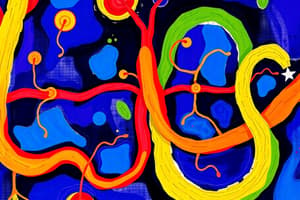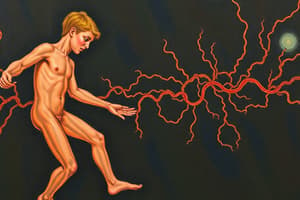Podcast
Questions and Answers
Which reaction is catalyzed by a biotin-requiring enzyme?
Which reaction is catalyzed by a biotin-requiring enzyme?
- Acetyl CoA → Fatty acids
- Pyruvate → Lactate
- Oxaloacetate → Phosphoenolpyruvate
- Pyruvate → Oxaloacetate (correct)
Which of the following reactions is specific to gluconeogenesis?
Which of the following reactions is specific to gluconeogenesis?
- Lactate → Pyruvate
- Oxaloacetate → Phosphoenolpyruvate (correct)
- Phosphoenolpyruvate → Pyruvate
- 1,3-Bisphosphoglycerate → 3-Phosphoglycerate
What is the effect of adenosine monophosphate (AMP) on gluconeogenesis?
What is the effect of adenosine monophosphate (AMP) on gluconeogenesis?
- No effect on gluconeogenesis
- Inhibits glycolysis
- Activates gluconeogenesis
- Inhibits gluconeogenesis (correct)
What happens to the NAD+/NADH ratio during the metabolism of ethanol?
What happens to the NAD+/NADH ratio during the metabolism of ethanol?
Which substrate's availability is decreased due to the increase of NADH during ethanol metabolism?
Which substrate's availability is decreased due to the increase of NADH during ethanol metabolism?
How does acetyl CoA influence gluconeogenesis?
How does acetyl CoA influence gluconeogenesis?
Which enzyme is downregulated by both fructose 2,6-bisphosphate and adenosine monophosphate?
Which enzyme is downregulated by both fructose 2,6-bisphosphate and adenosine monophosphate?
Which coenzyme is required by the pyruvate dehydrogenase complex?
Which coenzyme is required by the pyruvate dehydrogenase complex?
What is the primary consequence of decreased availability of oxaloacetate on gluconeogenesis?
What is the primary consequence of decreased availability of oxaloacetate on gluconeogenesis?
Which role does lactate play in gluconeogenesis?
Which role does lactate play in gluconeogenesis?
Which precursor is NOT involved in gluconeogenesis?
Which precursor is NOT involved in gluconeogenesis?
Which enzyme is NOT one of the three physiologically irreversible reactions in gluconeogenesis?
Which enzyme is NOT one of the three physiologically irreversible reactions in gluconeogenesis?
Which molecule activates pyruvate carboxylase in gluconeogenesis?
Which molecule activates pyruvate carboxylase in gluconeogenesis?
What effect does a rise in AMP have on gluconeogenesis?
What effect does a rise in AMP have on gluconeogenesis?
Which hormone is NOT associated with stimulating gluconeogenesis?
Which hormone is NOT associated with stimulating gluconeogenesis?
Which substrate is primarily utilized in gluconeogenesis during prolonged fasting?
Which substrate is primarily utilized in gluconeogenesis during prolonged fasting?
Where does the final step of gluconeogenesis occur?
Where does the final step of gluconeogenesis occur?
Which reaction is performed by PEP carboxykinase in gluconeogenesis?
Which reaction is performed by PEP carboxykinase in gluconeogenesis?
What is the effect of fatty acid degradation on gluconeogenesis?
What is the effect of fatty acid degradation on gluconeogenesis?
Which enzyme's deficiency results in severe fasting hypoglycemia?
Which enzyme's deficiency results in severe fasting hypoglycemia?
Flashcards are hidden until you start studying
Study Notes
Gluconeogenesis Overview
- Gluconeogenesis uses precursors such as glycolytic and TCA cycle intermediates, glycerol, lactate, and α-keto acids from glucogenic amino acids.
- It is essential for maintaining blood glucose levels during fasting, especially as glycogen stores deplete.
Key Enzymatic Reactions
- Seven glycolysis reactions are reversible and are also utilized in gluconeogenesis.
- Three irreversible reactions require alternative pathways:
- Pyruvate kinase
- Phosphofructokinase
- Hexokinase
Reversible Steps
- Pyruvate is converted to oxaloacetate by pyruvate carboxylase, which requires:
- Biotin
- ATP
- Allosteric activation by acetyl CoA
- Oxaloacetate is then converted to phosphoenolpyruvate (PEP) by PEP carboxykinase, which requires GTP.
- Fructose 1,6-bisphosphate is converted to fructose 6-phosphate via fructose 1,6-bisphosphatase, regulated by:
- Inhibition by AMP
- Activation by ATP
- Inhibition by fructose 2,6-bisphosphate (a glycolysis activator)
- Glucose is formed from glucose 6-phosphate by glucose 6-phosphatase, crucial in gluconeogenesis and glycogen degradation.
Hormonal Regulation
- Gluconeogenesis is stimulated by low insulin/high glucagon ratios.
- Glucagon and glucocorticoids increase transcription of the gene for PEP carboxykinase while insulin decreases it.
Fatty Acid and Amino Acid Metabolism
- Fatty acid degradation produces acetyl CoA, which cannot lead to glucose formation; it influences gluconeogenesis indirectly.
- Gluconeogenic substrates mainly derive from amino acid carbon skeletons, not from acetyl CoA.
Inhibition Factors
- Large amounts of avidin inhibit pyruvate carboxylase by sequestering biotin.
- The increase in NADH from ethanol metabolism reduces oxaloacetate production, thereby decreasing gluconeogenesis.
Key Inhibitory and Regulatory Molecules
- AMP and fructose 2,6-bisphosphate downregulate gluconeogenesis via inhibition of fructose 1,6-bisphosphatase and promote glycolysis through activation of phosphofructokinase-1.
Acetyl CoA Role
- Acetyl CoA inhibits pyruvate dehydrogenase, redirecting pyruvate from oxidation towards gluconeogenesis via activation of pyruvate carboxylase.
Studying That Suits You
Use AI to generate personalized quizzes and flashcards to suit your learning preferences.




